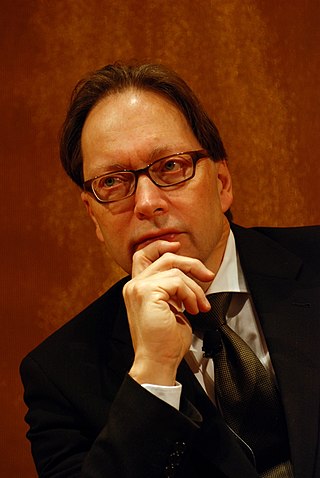
Alfred Bernhard Nobel was a Swedish chemist, inventor, engineer and businessman. He is known for inventing dynamite as well as having bequeathed his fortune to establish the Nobel Prizes. He also made several important contributions to science, holding 355 patents in his lifetime.

Horace Oscar Axel Engdahl is a Swedish literary historian and critic, and has been a member of the Swedish Academy since 1997. He was the permanent secretary of the Swedish Academy from 1999 to June 2009, when he was succeeded by Swedish author and historian Peter Englund.

The Nobel Prizes are five separate prizes awarded to those who, during the preceding year, have conferred the greatest benefit to humankind, as established by the 1895 will of Swedish chemist, engineer, and industrialist Alfred Nobel, in the year before he died. Prizes were first awarded in 1901 by the Nobel Foundation. Nobel's will indicated that the awards should be granted in the fields of Physics, Chemistry, Physiology or Medicine, Literature, and Peace. A sixth prize for Economic Sciences, endowed by Sweden's central bank, Sveriges Riksbank, and first presented in 1969, is also frequently included, as it is also administered by the Nobel Foundation. The Nobel Prizes are widely regarded as the most prestigious awards available in their respective fields.

The Nobel Prize in Physics is an annual award given by the Royal Swedish Academy of Sciences for those who have made the most outstanding contributions to mankind in the field of physics. It is one of the five Nobel Prizes established by the will of Alfred Nobel in 1895 and awarded since 1901, the others being the Nobel Prize in Chemistry, Nobel Prize in Literature, Nobel Peace Prize, and Nobel Prize in Physiology or Medicine. Physics is traditionally the first award presented in the Nobel Prize ceremony.

The Royal Swedish Academy of Sciences is one of the royal academies of Sweden. Founded on 2 June 1739, it is an independent, non-governmental scientific organization that takes special responsibility for promoting natural sciences and mathematics and strengthening their influence in society, whilst endeavouring to promote the exchange of ideas between various disciplines.

The Stockholm School is a school of economic thought. It refers to a loosely organized group of Swedish economists that worked together, in Stockholm, Sweden primarily in the 1930s.

The Nobel Foundation is a private institution founded on 29 June 1900 to manage the finances and administration of the Nobel Prizes. The foundation is based on the last will of Alfred Nobel, the inventor of dynamite.

Bengt Robert Holmström is a Finnish economist who is currently Paul A. Samuelson Professor of Economics (Emeritus) at the Massachusetts Institute of Technology. Together with Oliver Hart, he received the Central Bank of Sweden Nobel Memorial Prize in Economic Sciences in 2016.
Per Lennart Krusell, born 1959, is a Swedish macroeconomic theorist who is currently the Torsten and Ragnar Soderberg Chair in Economics and the Institute for International Economic Studies, Stockholm University, as well as Centennial Professor of Economics at the London School of Economics.
Torsten Persson is a Swedish economist who is the Swedish Research Council Distinguished Professor at the Institute for International Economic Studies, Stockholm University and Centennial Professor of Economics at the London School of Economics, and has held visiting positions at leading universities as Harvard, Princeton and Berkeley.

The Nobel Prize in Literature, here meaning for Literature, is a Swedish literature prize that is awarded annually, since 1901, to an author from any country who has, in the words of the will of Swedish industrialist Alfred Nobel, "in the field of literature, produced the most outstanding work in an idealistic direction". Though individual works are sometimes cited as being particularly noteworthy, the award is based on an author's body of work as a whole. The Swedish Academy decides who, if anyone, will receive the prize.

The Nobel Memorial Prize in Economic Sciences, officially the Sveriges Riksbank Prize in Economic Sciences in Memory of Alfred Nobel, is an economics award funded by Sveriges Riksbank and administered by the Nobel Foundation.
Tore Ellingsen is a Norwegian economist active in Sweden.

The Nobel Prize in Chemistry is awarded annually by the Royal Swedish Academy of Sciences to scientists in the various fields of chemistry. It is one of the five Nobel Prizes established by the will of Alfred Nobel in 1895, awarded for outstanding contributions in chemistry, physics, literature, peace, and physiology or medicine. This award is administered by the Nobel Foundation, and awarded by the Royal Swedish Academy of Sciences on proposal of the Nobel Committee for Chemistry which consists of five members elected by the Academy. The award is presented in Stockholm at an annual ceremony on 10 December, the anniversary of Nobel's death.

The Committee for the Sveriges Riksbank Prize in Economic Sciences in Memory of Alfred Nobel is the prize committee for the Nobel Memorial Prize in Economic Sciences, and fills the same role as the Nobel Committees do for the Nobel Prizes. This means that the committee is responsible for proposing laureates for the prize. The Committee for the Prize in Economic Sciences in Memory of Alfred Nobel is appointed by the Royal Swedish Academy of Sciences. It usually consists of Swedish professors of economics or related subjects who are members of the academy, although the academy in principle could appoint anyone to the committee. Two of the members of the founding committee as well as later members of the committee had also been associated with the Mont Pelerin Society.

Sara Maria Danius was a Swedish literary critic and philosopher, and a scholar of literature and aesthetics. Danius was professor of aesthetics at Södertörn University, docent of literature at Uppsala University and professor in literary science at Stockholm University.
Ingemar Ståhl was a Swedish economist and an economics professor from Lund University.
The 2022 Nobel Memorial Prize in Economic Sciences was divided equally between the American economists Ben S. Bernanke, Douglas W. Diamond, and Philip H. Dybvig "for research on banks and financial crises" on 10 October 2022. The award was established in 1968 by an endowment "in perpetuity" from Sweden's central bank, Sveriges Riksbank, to commemorate the bank's 300th anniversary. Laureates in the Memorial Prize in Economics are selected by the Royal Swedish Academy of Sciences. The Nobel Committee announced the reason behind their recognition, stating:
"This year's laureates in the Economic Sciences, Ben Bernanke, Douglas Diamond and Philip Dybvig, have significantly improved our understanding of the role of banks in the economy, particularly during financial crises. An important finding in their research is why avoiding bank collapses is vital."









